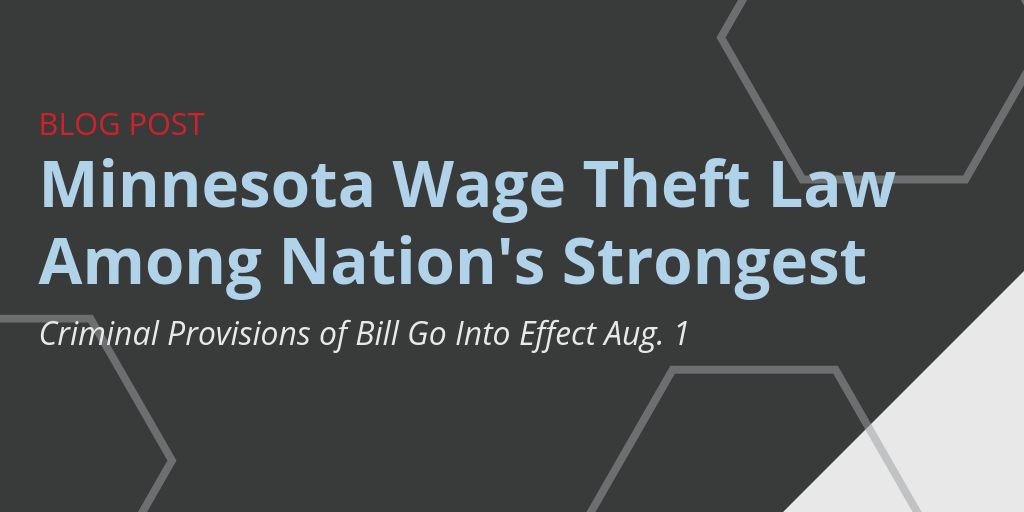LABOR LAW NEWS
Minnesota Enacts One of Nation’s Strongest Wage Theft Laws
By Kris Janisch
Published July 16, 2019

Portions of the bill went into effect July 1, 2019. But criminal provisions go into effect Aug. 1, 2019.
The Land of 10,000 Lakes is giving employers hundreds of thousands of reasons not to commit wage theft. Criminal provisions of Minnesota’s new wage theft law — including prison time and fines up to $100,000 — go into effect Aug. 1.
Lawmakers this May passed the measure as part of a larger Omnibus Jobs and Economic Development bill. (Certain provisions in the wage theft portion of the bill went into effect July 1.)
Broadly speaking, Minnesota’s new wage theft law:
- Makes it a felony to intentionally commit wage theft if the total is over $1,000
- Creates more detailed recordkeeping and notice requirements
- Adds funding for state inspection and enforcement of possible wage theft
There are serious penalties for employers who violate Minnesota’s new law. If the wage theft exceeds $35,000, the maximum penalty is $100,000 and/or up to 20 years in prison.
There are many forms of wage theft, including: overtime and “off-the-clock” violations, minimum wage violations, not paying workers the difference between their tips and the legal minimum wage, misclassifying employees and more.
Wage Theft and Employers
While not unique to Minnesota, the expanded recordkeeping requirements under the new wage theft law are stringent for employers. When workers start their employment, the employer must provide, among other information:
- Employee’s employment status and whether an employee is exempt from minimum wage, overtime and other state wage and hour laws, and on what basis
- Number of days in the employee’s pay period and the regularly scheduled payday
- Date the employee will receive the first payment of wages earned
- Employee’s rate or rates of pay and the basis if it, including whether the employee is paid by the hour, shift, day, week, salary, commission, etc.
The impacts of the legislation are already being felt. Just days after portions of the bill went into effect, construction workers in Rochester, Minn., alleged a firm withheld wages on a $40 million city project in 2018.
Find more detailed information on the Minnesota Department of Labor and Industry website.
Updated FAQ.
Wage Theft Happens
As Minnesota gives state departments more power to investigate and punish wage theft, there have been a growing list of laws nationwide aimed at helping workers recoup unpaid earnings.
Wage theft may not garner the headlines of minimum wage, for example, but it is more common than one might imagine. According to a 2017 Economic Policy Institute report, in the 10 most populous states, underpayment of wages is more than $8 billion annually. Also, 17 percent of minimum wage workers, 2.4 million in those 10 states, report being paid less than applicable minimum wage, according to the study.
Yet wage theft extends beyond minimum wage workers. Good Jobs First, a nonprofit Washington, D.C.-based policy resource center, said in a 2018 report that large corporations have paid out billions to resolve wage theft suits, including many white-collar jobs.
Related: 5 Things You Didn’t Know About Wage Theft
Wage Theft Laws
Employment laws continue to grow and change across the country. Wage theft protections are, of course, among them.
At least 10 states now allow workers to put a lien on an employer’s property in connecting with a wage claim, with New York closing in on its own bill. Meanwhile, Colorado this year made wage theft a felony if the amount is more than $2,000.
Combating wage theft (intentional or otherwise) is just part of the compliance matrix for HR and payroll teams. And Minnesota’s new law is good example of the complexities — and seriousness — of navigating this ever-changing landscape.
This Labor Law News Blog is intended for market awareness only, it is not to be used for legal advice or counsel.
Keep Informed
with GovDocs Labor Law News
Who is GovDocs?
GovDocs simplifies the complexity of employment law management (ELM) for large, multilocation employers across all industries. We offer a suite of innovative compliance products, including labor law postings, data software applications and other program management tools, to ease the day-to-day responsibilities of human resources, compensation, legal and finance teams.
Have less than 30 locations?
The GovDocs Poster Store simplifies the complexity of posting compliance for employers with less than 30 locations across all industries. We offer a variety of posting products to meet your labor law compliance needs, including federal and state posters; county and city poster packages; and other HR posters. Plus, when you purchase posters with GovDocs Update Service, you ensure your locations automatically receive updated posters whenever changes occur.


